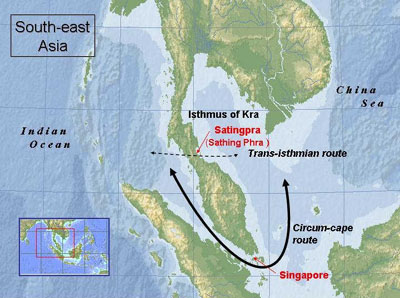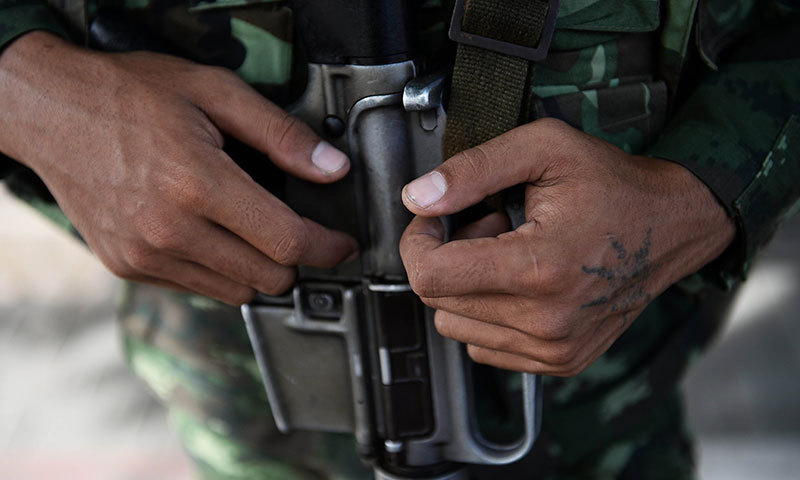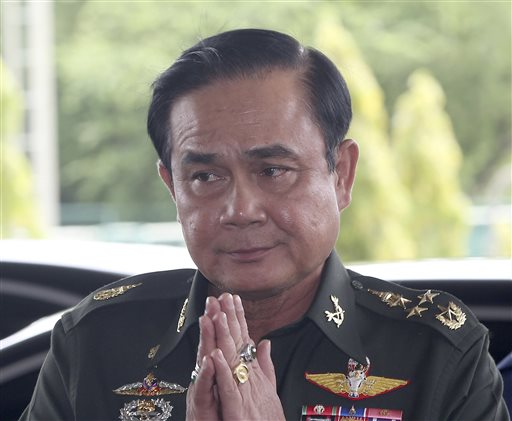- Reaction score
- 33
- Points
- 560
While most people really know Thailand as an attractive tourist destination for HLTA, there are many issues simmering beneath the surface. A convulsion in Thailand will certainly have regional implications (much of the economic activity of nations like Viet Nam, Laos and Cambodia are anchored on trade with Thailand), and the Chinese and Indians may also see this as affecting their interests in the region as well:
http://www.the-american-interest.com/articles/2014/01/31/thailands-looming-crisis/
http://www.the-american-interest.com/articles/2014/01/31/thailands-looming-crisis/
Thailand’s Looming Crisis
PETER MELLGARD, WALTER RUSSELL MEAD
Thailand’s struggles touch on issues that Thais for various reasons don’t like to speak openly and frankly about: the role of the monarchy, the health of the king and ethnic and regional divisions inside the country. But these issues are of the utmost importance.
Published on January 31, 2014
There’s been some interesting reporting from Thailand lately, but the press is still not getting a clear story out. It’s not that reporters are stupid; Thailand is hard to understand, especially for Americans. Thailand is one of those countries where people often speak indirectly if at all about some of the most important issues and foreigners often miss some of the key drivers in Thai politics because of it. The current struggles in the country touch on issues that Thais for various reasons don’t like to speak openly and frankly about: the role of the monarchy, the health of the king and ethnic and regional divisions inside the country. There are also legal restrictions about what you can say about the royal family; as a result even diligent consumers of the reportage on the Thai crisis miss some of the most important dimensions of the historic processes now taking place.
It’s unwise to understate how important King Bhumibol is to modern Thais. When he ascended to the throne in June 1946 he immediately sought to reverse years of decline in the power of the Palace, which had become politically powerless and financially broken. He soon established himself as a beloved figure in the eyes of millions of Thais. Thailand at that time was a mostly rural society: eighty percent of the nation’s citizens lived on small farms or in forests, and their lives revolved around the village and the temple. There was no concept of a modern state. As the country was transformed by a rapidly modernizing world, Thais looked to the King for guidance as they navigated a new and disorientating environment. Many were happy to accept the King’s authority and power over everything from rainfall to scientific development. Over a long and very able reign, the King was able to rebuild the prestige and authority of the throne and continues to enjoy personal power and respect far beyond the limited role that the Thai constitution affords.
The king, the army and the Thai business elite stood together and with the United States during the Cold War. Thailand was the last domino standing when Indochina fell to the communists in the 1970s, and the ties between Thailand and the United States strengthened afterwards as Thailand’s booming economy tied it more closely into the US-based international system.
King Bhumibol, now 86 years old and said to be in poor health, has been on the throne for more than 60 years. Even his critics (and despite Thailand’s very tough laws that make criticizing the King a criminal offense, he has them) concede that his reputation for personal incorruptibility, concern for the poor, and dedication to the Thai people and nation give him a unique stature. No other figure is trusted by as many people to work out compromise solutions and despite the constitutional limits on monarchical power, the king’s soft power (combined with the army’s unswerving loyalty) give him a uniquely powerful role.
Today, the survival of the Thai monarchy is again in jeopardyToday, the survival of the Thai monarchy is again in jeopardy. The 86-year-old Bhumibol is unique and his personal popularity is far greater than other members of the royal family. His son is widely disliked, said to be cruel and a womanizer, disengaged from the country he will one day rule. Bhumibol has been estranged from his wife, Queen Sirikit, whom Thais tend to fear and mistrust, for twenty years. His daughter is a favorite to succeed him but that would violate centuries of tradition. The coming succession crisis, which will pit different Palace factions against populists like former prime minister Thaksin Shinawatra, powerful elite businessmen and politicians, and the military, will threaten to tear the country apart.
Broadly, the current political crisis consuming Thailand pits the yellow shirts, Bangkok’s middle class and royalist establishment, against the red shirts, the mostly poor farmers and rural supporters of the current prime minister, Yingluck Shinawatra, and her brother Thaksin, who lives in exile after a military coup overthrew his government in 2006. The red shirts favor democracy, because they always win by landslides. The yellow shirts favor the military and the monarchy, because these institutions provide a buffer between educated urban Thais and the masses of rural Shinawatra supporters whom they dislike and consider poor and uneducated. The yellow shirts, led by a “notoriously corrupt” former deputy prime minister named Suthep Thaugsuban, are the ones on the streets of Bangkok these past few weeks protesting against the Yingluck government and preventing people from voting in the early election scheduled for this weekend. Both sides claim to revere King Bhumibol and invoke his name to claim the right to rule the country. The rivalry between yellow and red has simmered for years, but with the King’s reign approaching its final stages, the stakes become much higher and the fight more violent and divisive.
2011_thai_general_election-1
2011 election results. Map by Lindsey Burrows.
There are additional complicating factors. The yellow shirts have their strongest base of political support in southern Thailand and Bangkok. The red shirts are dominant in the north (where Thaksin has his roots) and the northeast. Many in the northeast think of themselves as Lao, and have a culture and history that look across the Mekong to modern Laos more than to Bangkok in the south. There are many in the south who have close ethnic and historic relations with Malaysia. And finally, Thailand has many citizens who are descended from 19th and 20th century immigrants from China. While Thaksin himself is “Sino-Thai”, one of the fault lines in Thai politics is the tension between the often urban, educated and professional Chinese immigrants and the often more rural and less educated Thais. That is not an uncommon area of political tension in the region; in Malaysia, Singapore and Indonesia, tension between the descendants of Chinese immigrants and their hosts sometimes flare into violence and always play a significant role in politics. Thaksin’s movement brings together many of the people who feel left out and left behind by what they see as collusion between the old Thai establishment and the successful immigrants. Thaksin’s programs that redistribute money from Bangkok to the rural areas have helped to solidify his support — and to inflame and envenom his opponents.
While the King lives, the prestige and authority of the throne survives. This gives the yellow shirts a trump card against populists like Thaksin. The throne is the yellow shirts’ greatest bulwark against the electoral majorities that Thaksin’s red shirts have enjoyed for years. Even if the king’s heir is among the wisest and greatest of mortals—and, in the opinion of many Thais, the heir would need to grow dramatically as a person to achieve this kind of stature—it would take time for the throne to regain the influence the present king has built up. That means that the end of his reign is full of risk for the yellow shirts, which is why they are pushing so hard for what in essence would be a military coup with royal blessing while the current King still occupies the throne. Only the blessing of a beloved king could give any kind of legitimacy to whatever government might come if the present one is overthrown, and it is easiest to understand the tactics of the yellow shirts if one starts from the belief that their goal is to take power while King Bhumipol could (if he chooses) give their government his sanction.
But the interests of a dynasty may not always be those of its strongest supporters. If we were advising the royal family, we would say that a constitutional monarchy can strive to mitigate the harshness of politics and speak for the nation as a whole, but it cannot fight the people’s will. The throne must be above politics or the question of the monarchy’s survival will inevitably become a political question. King Bhumibol is a unique figure in Thai and even world history; as a constitutional monarch he accumulated tremendous power. But the personal power of one constitutional king is not the institutional power of a dynasty or a constitutional monarchy. Moreover, to survive, constitutional monarchies must move with the times.
Sometimes the most zealous supporters of a monarchy are the source of its greatest dangers. Those who oppose timely reforms and adjustments, or those who push kings to take extreme positions have led many monarchs in world history to disaster. For the Thai monarchy to survive, which seems to be something most Thais very much want to see, it must remember something that has always been at the center of King Bumibol’s vision: that the abiding source of a constitutional monarchy’s soft but very real power is the affection and respect in which the institution is held by the people at large. King Bhumibol so far seems to have chosen to withhold his blessings from those who want to overturn the results of Thailand’s electoral process. To moderate the policies of government and to induce the opposition to remain within the bounds of the law: that is the policy that is most in keeping with the genius of the king’s long reign. It is the policy that Thailand most needs now.








